War
Travel and war may not appear to share many common aspects, yet they are intertwined in many ways. Wars have dictated the course of human journeying and exploration, changing geographic boundaries, influencing the movement of people, and defining new social, economic, and political landscapes. When viewed from the perspective of travel, war throws light on several unique aspects of history, politics, human relationships, and life itself.
War Sites as Tourist Attractions
In the aftermath of most wars, what's left behind are ruins and relics that eventually become poignant reminders of history. Many war-related sites, including battlefields, memorial monuments, war museums, and cemeteries, have become significant tourist destinations. They serve dual roles as educational resources and tools for remembering and honoring those who have fought and even laid down their lives.
Visiting these sites provides a deep historical context that broadens understanding of past events. Moreover, it creates awareness and respect for the sacrifices undertaken during these periods of conflict. For instance, the concentration camps in Auschwitz, the Vietnam war memorial in Washington D.C., and Hiroshima Peace Memorial Park in Japan are all vivid reminders of the horrifying realities of war, but also of bravery, resilience, and the power of peace.
Impact of War on Traditional Travel Routes
Wars have a profound impact on human movement and migration. As conflict zones emerge, traditional travel routes may be abandoned or modified, leading to new patterns of movement and migration. For instance, during World War II, many European routes were blocked or diverted, forcing individuals to seek alternative paths for travel or even to flee their homes.
In addition, wars can result in the creation of new borders which can affect travel for decades to come. A prime example is the division of Germany into East and West in the aftermath of WWII, a division that significantly affected travel between the two parts for decades.
The Thrill of Conflict Zone Tourism
A growing trend in recent years is what's known as dark tourism or war tourism, which involves visiting places associated with death, suffering, and atrocities. People are drawn to these places out of a morbid curiosity, a desire to understand the horrors of war, or to pay homage to those who suffered. Popular examples of this include guided tours to the demilitarized zone (DMZ) between North and South Korea, tours to Chernobyl in Ukraine, and trips to conflict zones like Afghanistan and Iraq.
Despite obvious risks, this form of tourism appeals to thrill-seekers and those interested in getting a first-hand experience of areas impacted by conflict. Such experiences, however, raise ethical questions about voyeurism and the potential trivialization of human suffering.
War's Influence on Culture and Culinary Exchanges
War influences more than just geographic boundaries and political scenarios. In many cases, war brings together different cultures and culinary traditions as people migrate and adapt to new environments. Soldiers, refugees, and other war-impacted individuals carry their food traditions with them, influencing local cuisines and catalyzing culinary exchanges. For example, the global spread of Vietnamese cuisine, particularly Pho, can be traced back to migration during and after the Vietnam War.
The Legacy of War in Literature and Art
Wars have inspired countless pieces of literature, art, cinema, and music. They carry tales of human courage, tales of loss and heartbreak, and tales of unity and division. These narratives not only shape a significant portion of global culture but also influence how individuals perceive and interpret conflicts both past and present.
Witnessing the physical locations where these narratives unfolded could be a transformative travel experience. For instance, exploring the trenches of World War I, walking along the war-torn streets of Syria, or visiting Anne Frank's house in Amsterdam enables a deeper understanding of these historic events.
Conclusion
While war and conflict undeniably cause devastation and sorrow, they also impact the course of human history and travel in profound ways. War sites serve as vital educational tools, offering insights into the past and inspiring reflections on the human capacity for both destruction and resilience. They help us remember, learn, and hopefully, work towards a future where such violence can be avoided. As travelers, we have a responsibility to approach these sensitive locations with respect, understanding, and a readiness to learn. Although war might be a deterrent for the peace-loving traveler, its influence on the travel landscape cannot be denied.
Iran Iraq Overflight Avoidance Extends Flight Times

Thailand Cambodia Border Conflict Travel Zones
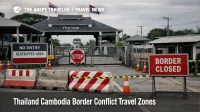
Thailand Cambodia Border Clashes: 50 km Avoid Zone
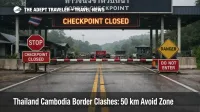
Thailand Cambodia Border Curfews Close Crossings
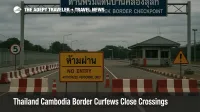
Thailand Cambodia Border Clashes Tighten Travel Zones
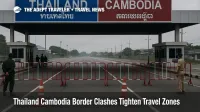
Travel Amid the Israel Iran War: Why Advisors and Insurance Matt

Delta Extends Flight Suspension to Tel Aviv Until March 2025 Amid Regional Conflict

Crystal Alters Cruise Itineraries Amid Red Sea Tensions
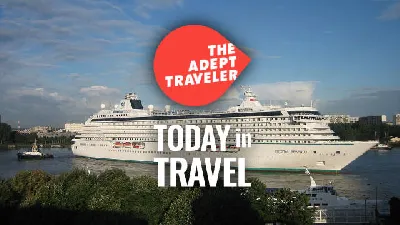
MSC Orchestra's Mediterranean Voyage: Shift from Red Sea 2023-2024

Israel Faces Conflict: What U.S. Travelers Need to Know

Travel Disruptions Due to Israel-Hamas Tensions

